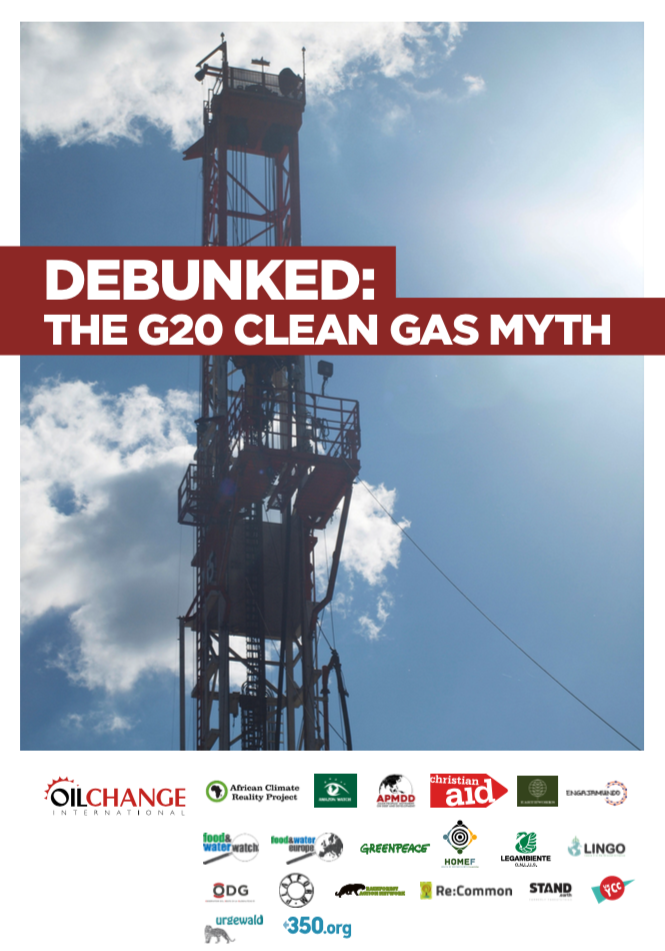Oil Change International in collaboration with:
African Climate Reality Project, Amazon Watch, Asian Peoples’ Movement on Debt & Development, Christian Aid, Earthworks, Engajamundo, Food & Water Europe, Food & Water Watch, Greenpeace, Health of Mother Earth Foundation, Leave it in the Ground Initiative, Legambiente, Observatori del Deute en la Globalització, Platform, Rainforest Action Network, Re:Common, Stand.earth, UK Youth Climate Coalition, urgewald, and 350.org
Download the full report.
Descargar en español.
This report focuses on fossil gas development in the G20 and debunking the myth of fossil gas as a clean transition fuel. The report finds that:
- The concept of fossil gas as a “bridge fuel” to a stable climate is a myth. Emissions from existing gas fields, alongside existing oil and coal development, already exceed carbon budgets aligned with the Paris Agreement. Even if all coal mines were shut down tomorrow, the gas and oil in already-developed fields alone would take the world beyond the carbon budget for a 50% chance at staying below 1.5ºC of global warming.
- Despite this reality, G20 countries are projected to host investment of over $1.6 trillion USD in new gas projects by 2030. If this happens, emissions unlocked through 2050 would make it extremely difficult to meet the goals of the Paris Agreement, which has been signed by all G20 members.
- Five countries – the United States, Russia, Australia, China, and Canada – are projected to be responsible for 75% of capital expenditures in gas production in G20 countries from 2018-2030.
- Argentina’s push to open massive shale gas deposits to investment risks undermining its commitment to the Paris Agreement and the work of the Energy Transitions Working Group during its G20 Presidency.
This report is one of two reports published simultaneously that question the ongoing push for expanding fossil gas production in G20 countries.
This report, ‘Debunked: The G20 Clean Gas Myth,’ focuses on fossil gas development in the G20 and debunking the myth of fossil gas as a clean transition fuel.
The partner report, ‘Debunked: The Promise of Argentina’s Vaca Muerta Shale Play,’ published by Greenpeace in Argentina, focuses on the myths surrounding the development of shale gas in Argentina, particularly the Vaca Muerta shale play. It is available at: https://priceofoil.org/debunked-vaca-muerta



End our reliance on fossil fuel and fracking our lands. It is exasperating climate change. We need to stop subsidizing big oil and invest in clean energy. Save the Oceans, rivers and air.
What Ann wrote!
Great work with your debunking report! Also ‘Beyond Zero Emissions’, and ‘Energy Networks Australia’ do the maths to help us understand the renewables position. And a fantastic book “Sunburnt Country” by Joelle Gergis, (2018) analyses Australian climatology and World Climate Change – and contributes to the Intergovernmental Panel on Climate Change 5th Report. The bottom line is that there is no other way than use of renewable energy to maintain human life on earth – as we know it. National Governments of climate change deniers merely delay the inevitable and make it more difficult to implement the necessary changes, and increase the ferocity of climate warming outcomes when they are not mitigated early enough.
Wind and solar’s intermittency means that building wind and solar is just an expensive way to burn more natural gas. Wind and solar are not synonymous with reducing CO2.
As long as the environmental lobby insists on focusing on (the failed solutions of) wind and solar for climate change, the use of gas to mitigate intermittency will increase.
In the real world, no nation or locale has made substantial CO2 reductions with wind and/or solar (the bulk of Germany’s “renewable” generation is wood burning).
Important conservative point to be made but you need to do better since we are going off the climate cliff.
Bob Howarth only gets a footnote but he and Aggrafeia at Cornell claim a 9% leakage rate from satellites and 3% more downstream with conventional gas being twice as bad as coal and fracked gas about 2 1/2 worse I believe.
You could do more with this ‘worse case scenario’ in your LNG analysis–20% worse? Argentine gas, the new Russian Arctic plant, US export…all LNG.
What is your atmosphere assumption–methane is 33 times worse over 100 years or 100 times worse over 10-12 years?
We need a Social Cost of Methane everywhere–even a conservative number will make gas unaffordable. Obama established one, Trump downgraded it, but MN where I am is methane-blind.
–John Munter, Warba, MN
@JWalther: Not true, the bulk of Germany’s renewables comes from wind NOT biomass (https://www.energy-charts.de/energy_pie.htm). Wind is the cheapest form of energy production now, particularly onshore wind – and it currently makes up 20.1% of the country’s total energy use. Biomass is just 8.5%. With the onset of batteries, not just Tesla, and electric vehicle transformation, makes balancing the grid much easier. Also decentralised renewable energy means more energy democracy for local communities. Already some countries offer payments to send excess energy to the grid or store in home batteries for evening use. And yes, it produces less CO2 and methane than extracting fossil fuels, particularly fracking for them than renewables, which use free, clean energy from the same tech for more than 20 years.